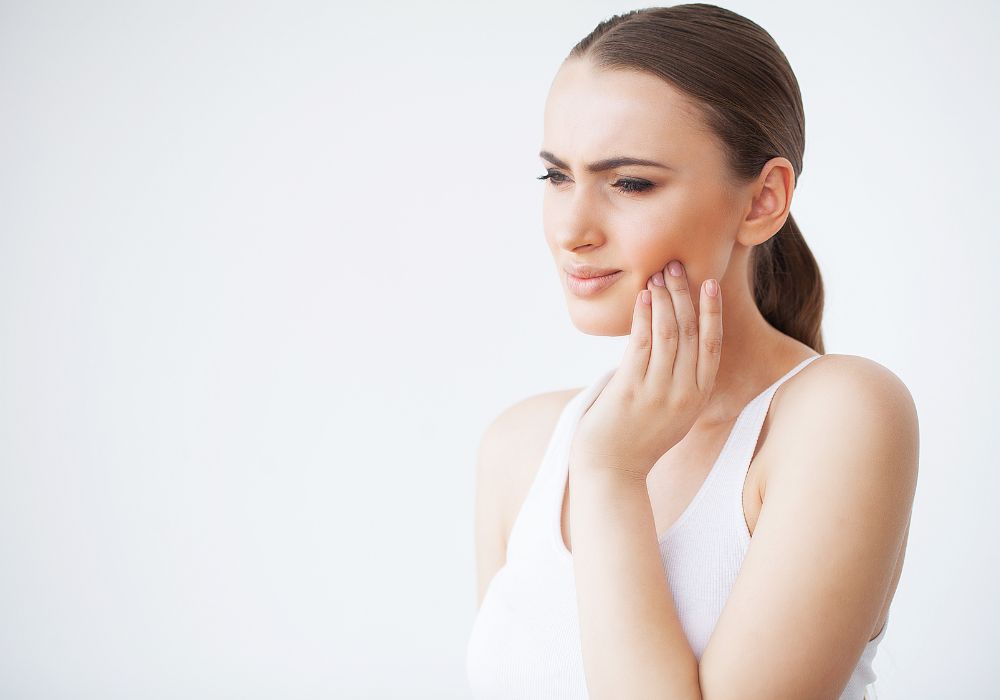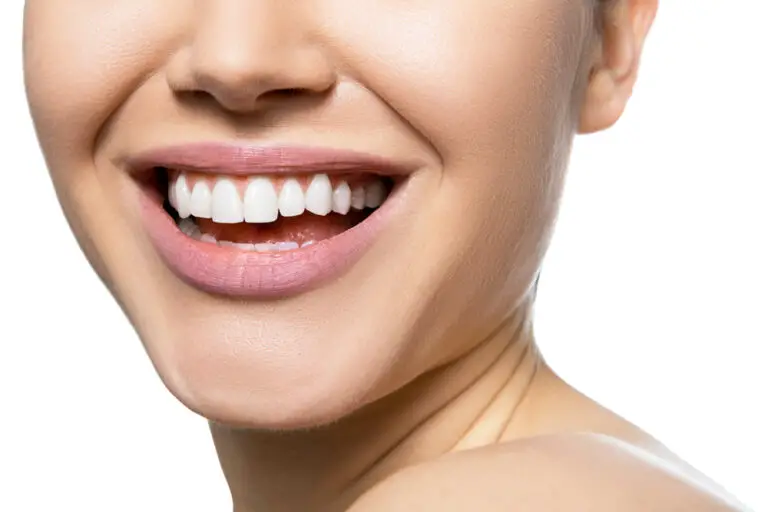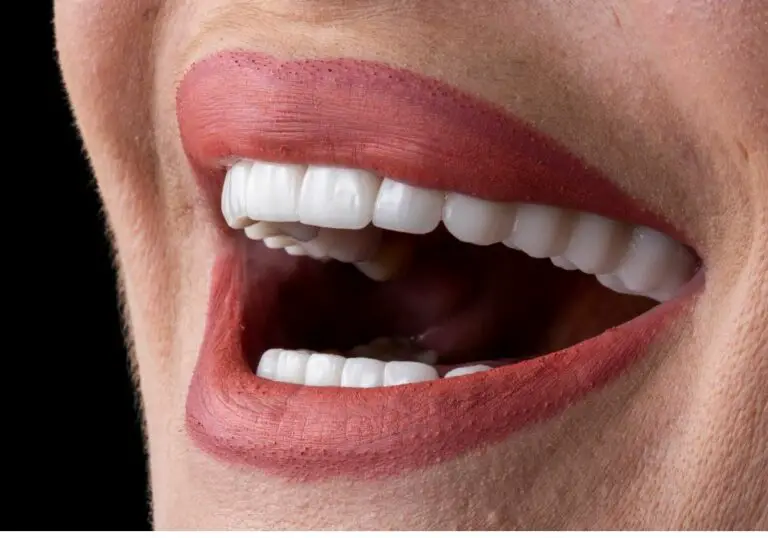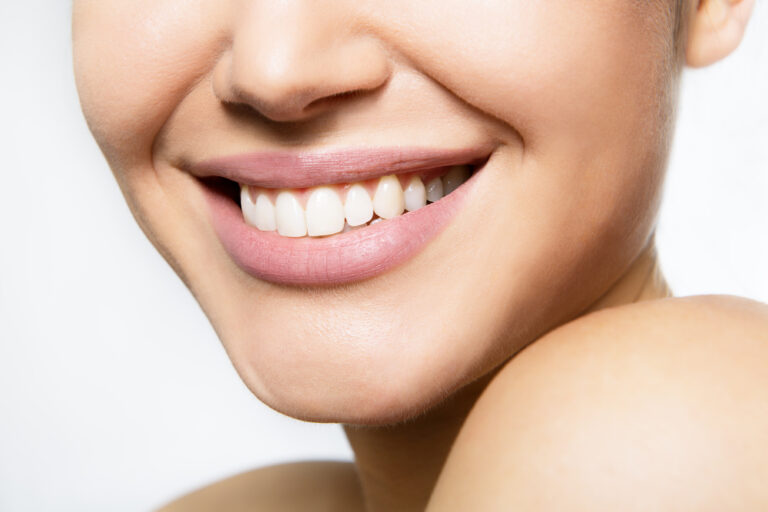Have you ever bitten into something cold and felt a weird tingling or tickling sensation in your teeth? This experience is common and can occur for several reasons. Understanding what’s happening when you have sensitive teeth can help you address the cause and find relief.
What Causes Tooth Sensitivity?
Tooth sensitivity, also called dentin hypersensitivity, occurs when the dentin layer under your tooth enamel becomes exposed. Dentin contains small tubules that lead to the inner pulp and nerves of the tooth.
When the enamel erodes or gums recede, the dentin tubules open up. This makes the nerves more susceptible to stimulation from hot, cold, acidic, or sugary foods and drinks. The nerves register this stimulation as pain or sensitivity.
Several factors can lead to exposed dentin and sensitive teeth:
- Gum recession – When gums recede, it leaves the dentin uncovered. Gum disease is a common cause.
- Cracked or worn enamel – Damage to the protective enamel layer also exposes the sensitive dentin.
- Teeth grinding – Grinding or clenching puts excessive force on teeth and can wear down enamel.
- Acidic foods – Frequent consumption of acidic foods and drinks can erode enamel over time.
- Tooth whitening – The chemicals in whitening strips or gels can make teeth more porous and cause sensitivity.
- Recent dental work – Procedures like fillings, crowns, and tooth extractions can cause temporary sensitivity as teeth adjust.
Why Does Sensitive Dentin Cause Tickling?
When dentin tubules are open, hot or cold stimuli generate fluid shifts and pressure changes. This stimulates the nerves inside the tubules, causing discomfort.
However, the sensations are not always sharp pain. Some people describe sensitive teeth as feeling ticklish, tingly, or prickly.
Dentin hypersensitivity can also cause teeth to feel:
- Zinging
- Stabbing
- Shocking
- Stinging
- Throbbing
These responses suggest the nerves are picking up on stimulation and reacting, even if you wouldn’t describe the feeling as painful. The nerves are communicating that something is happening to the tooth.
In other cases, the nerves may fire in a way that feels somewhat ticklish or tingly simply due to how your brain perceives the signals. Your individual nerve pathways and neural responses determine your subjective experience.
Dental Causes of Tickling Sensations

Beyond everyday sensitivity, some dental conditions could also be behind a tickling feeling in your teeth:
1. Minor tooth fracture
Cracks within the enamel are common and typically harmless. But in some cases, a fracture may reach the inner dentin and cause sensitivity. The exposed dentin nerves can react by feeling ticklish.
2. Dental cleaning
Scraping and abrasion during a dental cleaning aim to remove tartar and plaque buildup. But this can also cause minor enamel abrasions that expose a bit of dentin. This typically heals within a few days but may cause temporary tickling.
3. Irritation after dental work
Dental procedures like fillings, implants, crowns, and tooth extractions can leave teeth feeling irritated as they recover. Post-procedure inflammation near exposed dentin can lead to tickling sensations.
4. Nerve irritation
In rare cases, a damaged root, cyst, abscess, or other issue results in a damaged or inflamed nerve. Nerve irritation in the pulp can cause tingling, tickling, or other strange sensations.
Is Tooth Tickling Harmful?
Mild tooth tickling or tingling is not harmful and will often resolve on its own once the trigger, like a hot or cold drink, is removed. However, chronic, severe, or persistent sensitivity and nerve reactions merit an exam.
Ignoring significant tooth sensitivity can allow enamel loss, gum erosion, dental fractures, nerve damage, or underlying problems to worsen. See your dentist if tooth sensitivity:
- Occurs frequently from normal stimuli like warm food
- Persists more than 2-3 weeks
- Disturbs sleep
- Worsens over time
- Is severe or extremely uncomfortable
- Happens without any trigger
- Accompanies other dental symptoms like pain, swelling, or bad taste
Prompt evaluation and treatment can identify the cause, prevent further damage, and help manage sensitivity or discomfort.
Key Factors that Contribute to Tickling Teeth Sensations

A few key factors play a role in making teeth susceptible to sensations like tickling when consuming hot or cold foods and drinks. Understanding what puts you at risk for dental sensitivity empowers you to protect your enamel and nerves.
1. Enamel Loss
Enamel is the hard, outer layer of the tooth. It covers and protects the sensitive dentin and inner pulp. Enamel is translucent and allows your teeth to maintain their color.
However, enamel is susceptible to erosion from acidic foods, abrasion from aggressive brushing, and wear and tear over time. As enamel thins or develops microscopic cracks, the nerves become more exposed. This magnifies sensitivity and reactions to stimuli.
Making matters worse, enamel cannot regenerate or grow back like other body tissues can. Once enamel is damaged or eroded, you cannot remake it. This means it’s crucial to avoid unnecessary enamel loss.
2. Gum Recession
Your gums provide another layer of protection for your teeth. Healthy gums cover and shield the dentin where nerves enter the teeth.
But gum disease and persistent inflammation cause gums to recede and pull away from teeth. According to the CDC, about half of adults over 30 have some degree of gum disease and recession.
Receding gums expose the tooth roots and dentin surface to the elements. The nerves have less insulation, so hot and cold foods can generate tickling and other sensations.
3. Aging
Neither your gums nor enamel last forever. As you age, gums naturally recede, and decades of wear and tear cause enamel to thin. These cumulative changes make teeth more vulnerable.
According to the ADA, people over age 55 represent the majority of tooth sensitivity cases. However, younger adults with dental erosion or gum disease may also struggle with sensitivity.
4. Brushing Too Hard
Vigorous tooth brushing seems like a good way to clean teeth, but the abrasion can erode enamel over time. Using a hard-bristled brush and applying excess pressure during brushing accelerates enamel loss.
This allows hot and cold sensations to reach the nerves more readily. Gentle, circular brushing motions are best for protecting enamel.
5. Grinding and Clenching
Involuntary grinding or clenching, especially at night, puts intense pressure on teeth. This eventually loosens teeth and fractures the enamel. Exposed areas become prone to sensitivity.
Grinding and clenching often relate to stress and anxiety. Managing these triggers can reduce the frequency and intensity of grinding and prevent damage.
6. Acidic Foods and Drinks
Acidic foods and drinks progressively weaken enamel. Carbonated soft drinks, citrus fruits and juices, pickles, wine, and coffee are common culprits.
Limiting acidic items and drinking with a straw aims the acid away from teeth. Also waiting 30 minutes after eating or drinking something acidic before brushing gives enamel time to re-harden.
Tips for Preventing Tickling Teeth

You can take proactive steps to keep your enamel strong and gums healthy. This reduces the likelihood of experiencing weird tooth sensations.
- Choose non-abrasive toothpaste – Look for brands formulated for sensitivity or enamel protection. Using an electric toothbrush also causes less wear than vigorous manual brushing.
- Brush carefully and avoid hard bristles – Let a soft-bristled brush glide gently across teeth instead of scrubbing vigorously. Take care brushing near the gumline.
- Use fluoride toothpaste/rinse – Fluoride remineralizes enamel and makes it more resistance to damage from acidic foods. But don’t rinse right after brushing, as you’ll wash away the fluoride.
- Drink water after acidic drinks or foods – Rinsing with water balances out acids and gives enamel time to re-harden. Drinking water also stimulates saliva flow, which naturally neutralizes acids.
- Limit acidic foods and sugary snacks – Read labels and be aware of items that can erode enamel. Cut back on acidic drinks and junk food, and enjoy them in moderation if you do indulge.
- Address grinding/clenching – See your dentist for a mouthguard or splint. Relaxation techniques and stress management can also help.
- Get regular dental cleanings – Let the dentist do the difficult cleaning so you avoid hard brushing. The dentist can also spot early signs of recession or damage you might miss.
- Use sensitivity toothpaste – Brands for sensitive teeth contain compounds like potassium nitrate to block nerve transmission in the dentin tubules. This reduces sensitivity to hot/cold stimuli.
Professional Treatments for Ticklish Teeth
If good oral hygiene and diet changes don’t resolve your teeth’s sensitivity and tickling, visiting the dentist can help identify issues. There are also professional treatment options to reduce sensitivity:
1. Fluoride Treatments
In-office fluoride applications are stronger than daily fluoride toothpaste. The dentist applies stong concentrations of fluoride varnish to teeth. Fluoride absorbs into the enamel to make it more acid-resistant and less porous. Fluoride also disrupts nerve signaling.
Fluoride treatments can manage sensitivity for 3-6 months before needing reapplication. They are painless and take just a few minutes to apply at a dental visit.
2. Tooth Sealants
Sealants provide a protective plastic coating over the chewing surfaces of back teeth. This seals out acids, temperature changes, and irritants from getting inside enamel pores and dentin tubules. Dentists often apply sealants to children’s teeth, but they can also help reduce tickling sensations in adult teeth.
3. Nerve Desensitization
If sensitivity is focused on a particular tooth or area, the dentist can use topical medications to calm the nerves. These include soothing and numbing gels/solutions containing compounds like potassium nitrate or silver nitrate. For extreme sensitivity cases, cauterizing the nerve may be an option.
4. Dental Restorations
Dental fillings, inlays, onlays, or dental crowns can cover over areas of exposed dentin and insulate the nerves. When placed properly, restorations shield the inner tooth and prevent uncomfortable sensations. However, restorations do require removing some natural tooth, so consider less invasive options first.
Dealing With Sudden Tooth Sensitivity
If your teeth never bothered you but suddenly feel ticklish, take quick action to determine the cause instead of waiting for it to potentially worsen. Some steps you can take at home:
- Rinse your mouth with a numbing oral pain reliever to temporarily ease sensitivity. This reduces stimulation to the nerves.
- Use desensitizing toothpaste for a few weeks to see if it resolves newfound sensitivity. These contain compounds to block nerve signaling.
- Avoid very hot or very cold foods/drinks that trigger discomfort. Stick to room temperature or lukewarm foods for a few days.
- Wear a nightguard if you suspect nighttime teeth grinding may be the culprit. Discontinuing grinding gives affected teeth time to heal.
- Monitor for cracks or damage that might have occurred. Even if you don’t see anything visible, microscopic enamel cracks could be causing symptoms.
If the sensitivity persists more than a week or two, make an appointment to have your dentist investigate further. Quick action prevents small problems from becoming serious issues.
When to See a Dentist About Tooth Tickling?

Do not delay in seeing a dentist if your teeth frequently feel ticklish or tingly, especially if accompanied by other worrisome symptoms. Telltale signs you need a dental evaluation include:
- Severe discomfort from hot or cold
- Advanced enamel loss or gum recession
- Lingering sensitivity after dental work
- Irritation from procedure
- Sensitivity without any trigger
- Damaged or inflamed nerve
- Sensitivity accompanied by tooth pain
- Dental abscess, fracture, or pulp inflammation
- Tingling sensation in nerves or gums
- Nerve injury or gum infection
The dentist can pinpoint what’s behind your symptoms. Prompt treatment improves outcomes and can prevent complications like pulpal infection or the need for root canals or tooth extractions.
Maintain Happy, Healthy Teeth
Occasional sensitivity or tickling from a cold drink isn’t too concerning. But persistent, frequent, or severe tooth sensitivity deserves professional care. Seeking help quickly keeps small problems from ballooning into tooth damage or dental emergencies.
With proper oral hygiene and preventive care, your teeth should feel comfortable, not ticklish. Protect your enamel and nerves by brushing carefully, limiting acidic foods, and getting regular dental checkups. Keep your choppers in top shape for chewing, smiling, and pain-free snacking.
Frequently Asked Questions About Ticklish Teeth
Why does sensitivity cause a tickling sensation in some cases?
The tingling or tickling feeling results from the nerves in the pulp and dentin picking up on stimulation from temperature changes. The nerve reactions may feel prickly or ticklish rather than overtly painful due to individual differences in how nerves communicate and the brain perceives signals.
Is it normal for teeth to feel ticklish sometimes?
Occasional sensitivity to hot or cold foods is fairly normal, especially if it quickly resolves once the trigger is removed. But frequent or persistent tickling sensations indicate exposed dentin or inflamed nerves that need evaluation.
What’s the difference between sensitive teeth and ticklish teeth?
These terms refer to the same phenomenon. Some people describe the feeling as sensitivity, others as tingling or tickling. The sensations arise from nerves in the teeth reacting to hot, cold, pressure, or chemicals.
Can cracked teeth cause a tickling feeling?
Yes, tiny cracks or fractures in the enamel can expose the dentin underneath. As hot or cold foods hit the crack, fluid shifts in the dentin cause a tingling sensation. Cracked teeth require dental repair to prevent worsening.
When should someone see a dentist about ticklish teeth?
Make an appointment if sensations are severe, last more than 2-3 weeks persistently, seem to occur spontaneously rather than from a trigger, disrupt sleep or daily activities, or accompany other symptoms like pain or swelling. Quick treatment is key.







